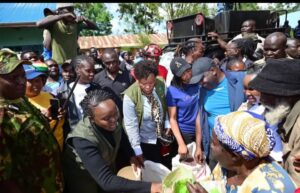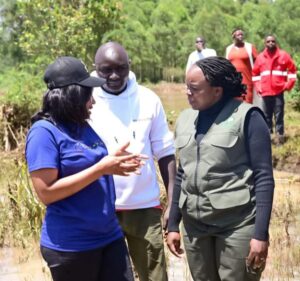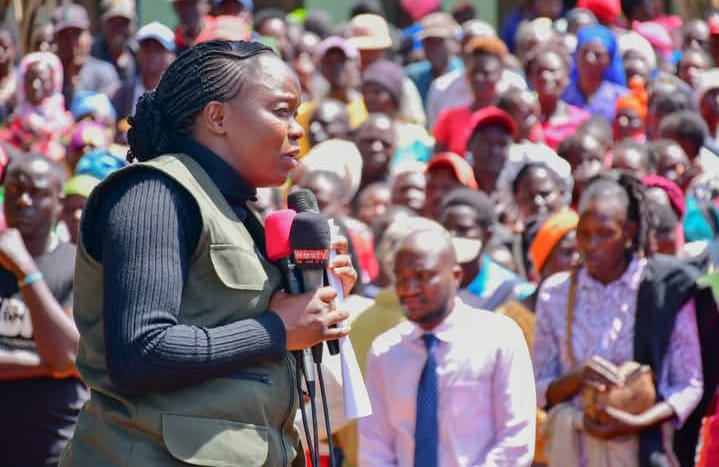By Deborah Barasa
In the wake of the tragedy that has befallen the Chesongoch community of Elgeyo Marakwet County, my heart is heavy with woe. Saturated by the relentless rains of our short rainy season, the earth moved with a violent and unforgiving rage, claiming precious lives and displacing multiple families from the solace of their homes. That single nightly cataclysm ended up scarring a landscape that has cradled generations. Similar hell in a hand basket befell Namanjalala area in Trans-Nzioa County courtesy of flooding. To the affected families, I say poleni sana.
Yesterday, Tuesday, the 4th of November, I stood upon the wounded ground of Chesongoch village before me, the distraught faces of the bereaved and the displaced. I encountered the same angst among the Namanjalala community kilometres away later in the day. In both places, I witnessed a sorrow that beyond our sympathy demands a resolute action to avert such tragedies in future.
In hindsight, the fatal mudslide is beyond a natural disaster. It is a conversation with a changing climate regimen and a manifestation of the new and unsettling climate-related realities we now face. The science behind all this is as clear as it is grim. It sounds a warning that the atmosphere holds more moisture and can unleash more intense and concentrated rainfall that our slopes, especially those already vulnerable, cannot endure.

Environment CS Deborah Barasa during food distribution to victims of Elgeyo Marakwet mudslide tragedy. Photo Courtesy
The deafening sound that rent the air on the night of the disaster as described by the residents of Chesongoch was, yes, of the soil and rock giving way but also the sound of a threshold being crossed and a painful echo of a planet under stress. Yet to Chesongoch this disaster is not new. The village bore the brunt of similar unfortunate eventualities in 2010, 2012, and again in 2020. Clearly, this is a recurring nightmare. It tells us that our past responses have been insufficient. We are, therefore, as it may seem, trapped in a cycle of mourning and rebuilding, without confronting the ever-looming risk itself.
All factors considered, even in this moment of loss, we must find the resolve to look forward with hope. To the people of Kenya, I issue a solemn and heartfelt plea born of the Chesongoch and Namanjalala tragedies. We must, collectively, keep a keener eye on our environment while remaining cognisant that the work of averting such disasters does not begin when the rains fall. It begins in the calm between the storms. It begins with our commitment to restoring our vital forest cover, which acts as a natural shield, its roots binding the soil and sipping the rainfall.
What I now call for is anchored on and comprehensively captured in the “Early Warnings for All Initiative”, a programme I launched on May 21st this year aimed at ensuring that life-saving alerts reach every Kenyan. All said an early warning is worthless without early action. This then requires a national conversation, from the uppermost echelons of Government to every homestead on how to plan and build in harmony with our environment, not in defiance of it.

CS Deborah Barasa. Photo Courtesy
My visit to Chesongoch and Namanjalala was a reminder that our climate disaster related policies must be written, first and foremost in the mud and the rubble where the vagaries of climate change can morph into catastrophes. While boardroom negotiations are still necessary, hands-on solutions to climate-related calamities remain markedly crucial.
As plans to identify alternative settlement for affected parties of Chesongoch and Namanjalala continue we should bear in mind that resettlement alone is not the ultimate answer. The true path to resilience against the mishaps we have witnessed lately of ought to be woven with a variety of threads. Henceforth, we must strive to modernise our meteorological infrastructure to better predict such events while at the same time empowering communities to understand and act upon the risks they face. This we shall do as Government as we pursue with an unyielding commitment the global climate goals we have set.
For now, yes, the hills of Elgeyo Marakwet and the Namanjalala terrain have wept, and we have felt every tear. As we mourn the recent flood related losses we ought to make this moment a turning point and honour the lost by building a future where the relationship between our people and our planet is one of respect and foresight.
The earth has spoken in a devastating language. We must be wise and listen, and courageous enough to act.
Barasa is the Cabinet Secretary for Environment, Climate Change and Forestry



